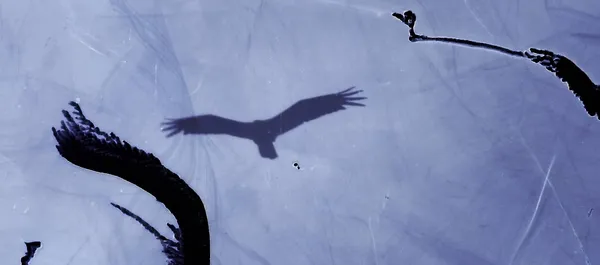Eye For Film >> Movies >> Vulture (2019) Film Review
Vulture
Reviewed by: Andrew Robertson

Vulture is not an easy film, one shot through with the materiality of film. Though it's only the credits and the programme notes that will tell you, it helps to know that its celluloid was processed with natural dyes and other substances extracted from a bank of flowers, a process that has embedded itself in scratches and flickers and streaks projected upon the screen. There are experimental films that do not with them bring warnings of strobe nor squalling tones somewhere in the electronic sonic region but this is not one of them. The chemistry of film and filming is such, though, that it makes something special.
In much the same way that even cover versions of Cage's 4'33" tell us something about the environment of performance, Vulture is contextualised by cinema performance. A sunny day outside is heard rather than felt in the chuckling wind through flowers as those passing by the emergency door contribute. Shots of watering hole beef and pork still ambulatory as animals with the silent shining of the projector give audiences the chance to hear the meat around them sough and whistle, the suckling of a pig at bovine teat as easy a reminder of (un)nature as the three (by my count) who had enough and made their way back to the world.

Vulture hangs, slow zooms to pigs in hollows, an agricultural oasis surrounded by goats and chickens and horses and tractors and rare human forms and shot by shot there is a sense of place - this wall is that wall, that shadow is here, the trailer brings the horses takes the horses, that wall is this wall. Multiple exposures themselves invite an almost aggressive recontextualisation, the cough and creak of chairs and sitters and the clatter and bark of fit and fitters from neighbouring construction. It overwhelms in places, like a black pudding supper, as much batter as bludgeon and heavier in place.
Philip Hoffman's work is a textbook Black Box entry, light goes into film, picture comes out. There are processes at play and hints thereof - and this is ever one of the delights of festival film.
There is snow and simultaneous scratches on the film and it's hard not to think of The Eyes Of Orson Welles some stretch of shoe leather from where I am sitting. There are forms of degradation that add depth and gradation like the bubbles and blisters over and under a babbling brook, a sediment of sentiment that might be clouding my judgement. It is perhaps grain or rain upon the sunflowers, but it has hard not to turn one's face towards it, to create meaning in a meditative geography, to fall under an alchemic charm. The screening I attended will not be the one that you go to, indeed, some who started the journey with me sought other avenues, but I do not doubt a similar transport awaits anyone who is circled by the vulture. As any child (and here one specific) will tell you, the vulture tells you where the meat is. Cracked marrow and all this is a visceral treat, though its experimental palette may be at once too much for some palates.
Reviewed on: 19 Jun 2019















